GALLUP NEWS SERVICE
PRINCETON, NJ -- According to the latest CNN/USA Today/Gallup survey, 59% of Americans oppose the war with Iraq, while just 39% favor it -- a substantial change from a March poll, when the public was evenly divided, 47% in favor and 47% opposed. This is the first time that a majority has expressed opposition to the war on this question, although these results parallel the findings from a June 6-8 Gallup Poll, which found 56% of Americans saying it was not worth going to war in Iraq, and 59% supporting at least a partial withdrawal of troops from that country.
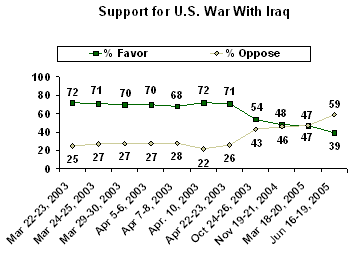
The decline in support for the war is found among Republicans and independents, with little change among Democrats. A substantial majority of Republicans continue to support the war, but the percentage in favor (70%) is 11 percentage points lower than it was in March (81%). Among independents, support has dropped by eight points (from 40% to 32%). Democrats show a 2-point increase in support, along with a 4-point increase in opposition, for a net negative increase of 2 points (from a net 63-point opposition in March to a 65-point opposition in June).
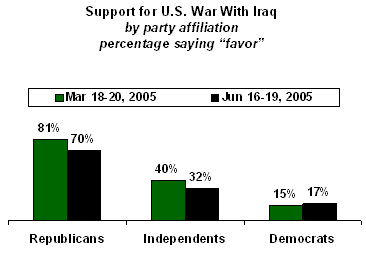
Public Favors Guantanamo Base Detention Facility
In recent weeks, various political leaders and media organizations around the world have called for shutting down the detention facility at the Guantanamo Naval Base, where the United States holds captive more than 500 prisoners, mostly from Afghanistan and Iraq. Opponents include several prominent Republican leaders, such as Florida Sen. Mel Martinez, a former George W. Bush cabinet member, as well as prominent Democrats, such as former presidents Bill Clinton and Jimmy Carter.
But the poll suggests that the public has yet to be persuaded. Overall, 58% say the government should continue to operate the facility, while 36% want to close it.
As you may know, since 2001, the United States has held people from other countries who are suspected of being terrorists at a detention facility in Guantanamo Bay in Cuba. Based on what you have heard or read, do you think the U.S. should -- [ROTATED: continue to operate this facility (or do you think the U.S. should) close this facility and transfer the prisoners to other facilities]?
|
Continue to |
Close |
No |
|
|
|
|
|
|
|
2005 Jun 16-19 |
58% |
36 |
6 |
Several news stories recently have reported on alleged abuses of prisoners at Guantanamo. The U.S. military has admitted using coercive interrogation techniques, although it denies such techniques amount to torture. When asked about U.S. treatment of prisoners at the base, 52% of Americans say they approve and 37% disapprove -- though intensity of feeling is not widespread. A majority of Americans feel "strongly" about the issue, and they split toward approval rather than disapproval by 33% to 23%. Another 44% do not feel strongly about the issue, including 11% who have no opinion, 19% who approve, and 14% who disapprove.
In general, do you approve or disapprove of the way the U.S. is treating the prisoners being held at Guantanamo Bay in Cuba? Do you [approve/disapprove] strongly, or not strongly?
COMBINED RESPONSES (Q.31-32)
|
|
Approve, strongly |
Approve, not strongly |
Disapprove, not strongly |
Disapprove, strongly |
No |
|
|
|
|
|
|
|
|
2005 Jun 16-19 |
33% |
19 |
14 |
23 |
11 |
These views are highly related to party affiliation, although the polarization between Republicans and Democrats is somewhat less than what is measured on support for the war in Iraq. Seventy-five percent of Republicans want to keep the detention facility open, compared with 38% of Democrats -- a difference of 37 points. By contrast, there is a 53-point difference between the two parties in their support for the war with Iraq.
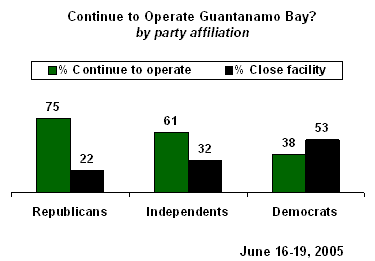
Similarly, 73% of Republicans approve of U.S. treatment of prisoners at Guantanamo, compared with 31% of Democrats -- a 42-point difference.
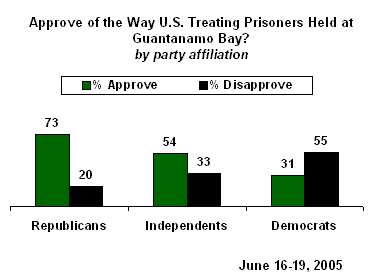
Public Concern About War on Terror Declines
The poll shows that since the end of the 2004 presidential election, Americans have become less concerned about terrorism. In three measures in 2004, the public was about evenly divided as to how likely there would be more terrorist attacks "over the next several weeks." About half thought such attacks were "very" or "somewhat" likely, while the other half thought they were "not too" or "not at all" likely. But in the two readings in 2005, a clear majority of Americans say the attacks are not likely.
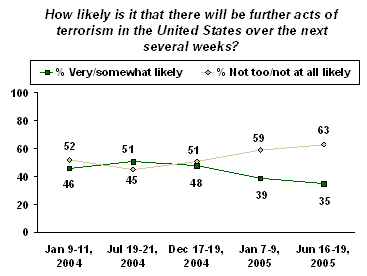
Similarly, in 2004, Americans were most worried about becoming a victim of terrorist attacks shortly before the presidential election, with 47% "very" or "somewhat" worried and 53% "not too" or "not at all" worried. But since that time, the percentage who are worried has dropped nine points (to 38%), and the percentage who are not worried has also increased nine points (to 62%).
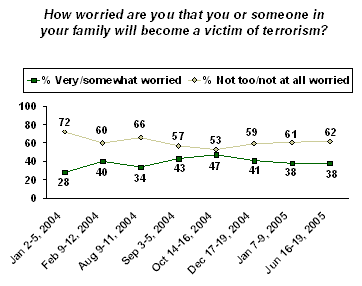
Satisfaction with the way things are going for the United States in the war on terrorism has declined in comparison with a similar reading in February, from a poll conducted immediately following the Iraqi elections. But current sentiment (52% satisfied to 47% dissatisfied) is now essentially back to what it was before the election in Iraq.
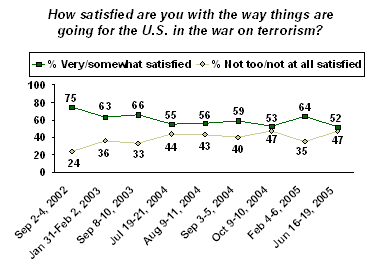
Confidence in the Bush administration to protect U.S. citizens has also declined since February, though it remains high -- 61% have a "great deal" or "moderate amount" of confidence, while just 38% have little or none at all. Current sentiment is similar to what it was last summer, though there was a spike in confidence in February.
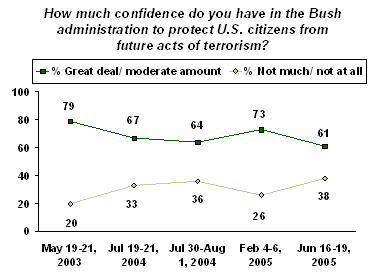
Bush's approval rating, 47%, remains unchanged since the previous poll at the beginning of this month, although approval is down 10 points from the Feb. 4-6 poll, when the two previous readings on terrorism were taken.
The current 51% disapproval ties with Bush's highest disapproval rating ever, measured in May 2004. It is only the third time that at least half of all Americans have expressed disapproval of Bush's overall job performance, the other time occurring in late May of this year, when 50% disapproved.
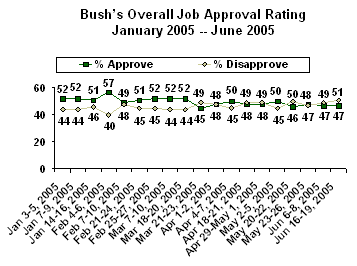
Survey Methods
Results in the current survey are based on telephone interviews with 1,006 national adults, aged 18 and older, conducted June 16-19, 2005. For results based on the total sample of national adults, one can say with 95% confidence that the maximum margin of sampling error is ±3 percentage points.
In addition to sampling error, question wording and practical difficulties in conducting surveys can introduce error or bias into the findings of public opinion polls.